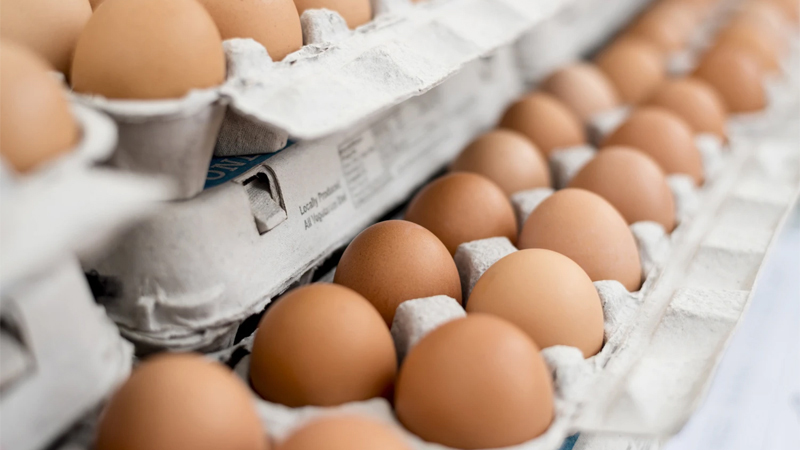 Following their defeat in the Presidential election, whenever a politician from the UNP, SJB, or the SLPP talk about their ambitions to strengthen the Opposition at the next Election, they seem to be missing out on a key element.
Following their defeat in the Presidential election, whenever a politician from the UNP, SJB, or the SLPP talk about their ambitions to strengthen the Opposition at the next Election, they seem to be missing out on a key element.
Their political discussions often seem to lack credibility and appear to be a bit eccentric and ‘one egg short of an omelette’.
How did egg prices fall after the last Presidential election? This has a story all its own. The current dip in egg prices is attributed to the last Presidential election. Anticipating demand from political parties looking to distribute food parcels at rallies, large-scale egg producers had stocked millions of eggs. But when the ruling National People’s Power (NPP) held rallies, attendees brought their own food instead of expecting handouts from their candidates.
This left suppliers unable to sell the excess stock as planned, leading them to release surplus eggs into the market at lower prices to avoid spoilage.
Egg suppliers who planned to profit from their eggs during the Election and unable to sell off their egg stock as planned, were left with egg on their face unable to sell the surplus eggs. They were forced to release them into the market at reduced prices to avoid spoilage.
Egg prices fall
Ironically, opposition parties that criticised the NPP’s no-giveaway rally approach, now find themselves watching egg prices fall. Had prices risen ahead of the upcoming Parliamentary Election, they would still be ‘doing their funky chicken’ dance.
At present poultry production in Sri Lanka is strengthening with small scale poultry farmers gradually returning to the industry with the advent of the new Government.
The All Island Egg Producers’ Association Chairman, Matali Jayasekara said all egg producers- small, medium and large-scale were confident that the new Government will take steps to uplift the local poultry industry.
He said consumers need not fear that egg and chicken prices would increase during the year. “There are enough egg stocks to meet the local demand and the prices will be between Rs. 32 and Rs. 40 during the festive season and throughout the year,” he said.
One of the main reasons that the previous Government delayed stabilising prices in the poultry industry was because they were looking to import eggs and chicken feed ingredients as these options seemed lucrative for their pockets.
They did not show any particular interest to develop the industry in a way that small poultry farmers too became independent and would be in a position to produce their own chicken feed with supplies of ingredients being available to them at lesser prices. This could have been achieved by improving local maize production through a steady supply of fertiliser for the crops and reducing taxes imposed on commercial poultry feed.
Agricultural input
The NPP Government’s policy is to manage agricultural input. The Government is committed to provide fertiliser and other agricultural input at reasonable prices, along with subsidies for chemical and organic fertiliser, in line with good agricultural practices. It has already implemented it. The Government has implemented a fertiliser subsidy, which was previously set at Rs. 15,000 per hectare and increasing it to Rs. 25,000 per hectare from last month according to of President Anura Kumara Dissanayake’s instructions as he is also the Agriculture Minister.
While the NPP rules the roost, it is unlikely to allow a shortage of day-old chicks and parental stocks, egg producers said. They added, “We are sure they will take steps to prevent manipulation of the egg market by a few players and will protect consumers”.
As of now, the country has sufficient eggs to meet the annual demand of over three billion eggs and more than 200 million kilograms of chicken produced annually, making any egg or chicken shortage unlikely. Production remains stable, with small-scale poultry farmers receiving support and facing minimal supply chain disruptions.
‘Bad eggs’
But the ‘bad eggs’ in the political arena are currently spreading stories that egg prices will soon go up and that the price of chicken has seen a decrease because small scale poultry farmers are selling off birds for meat as they consider leaving the industry due to the lack of poultry feed supplies and financial strain.
They circulate rumours to the effect that it will be difficult for consumers to purchase eggs in a few weeks for bakery preparation, especially for Christmas and the New Year. This is to gain petty political mileage at the Election.
According to the All Poultry Association Chairman, Matali Jayasekara, the present climate is favourable for poultry farmers, unlike during Presi dent Gotabaya Rajapaksa’s regime, when many smallholders exited the industry following a sudden shift to organic farming.
Organic fertiliser switch
The Gotabaya administration banned chemical fertiliser and agrochemicals based on a medical expert’s advice, urging farmers to switch to organic fertiliser. However, Gotabaya Rajapaksa’s organic fertiliser policy lacked a plan to produce and supply quality organic fertiliser suitable for various crops, including paddy, vegetables, export crops and maize. This worsened the country’s economy in mid 2021.
This policy shift led to a steep decline in crop yields, affecting essential feed grains such as maize and soybean. The resulting feed shortage and high costs pushed egg and chicken prices up in the market. Poultry farmers were struggling to manage escalating production expenses.
MRP for eggs
Following Rajapaksa’s dramatic exit from the presidency amid widespread protests over food and fuel shortages, President Ranil Wickremesinghe’s administration took steps to address escalating egg prices. Earlier this year, the Government set a maximum retail price (MRP) for eggs, capping them at Rs. 44 for white eggs and Rs. 46 for brown eggs. This move faced pushback from producers, who argued that the MRP was unsustainable given rising production costs, leading to supply disruptions.
This move faced resistance from poultry producers, who argued that the MRP was unsustainable due to higher production costs, leading to disruptions in egg supplies.
In response, the Wickremesinghe Government ramped up enforcement via the Consumer Affairs Authority (CAA), conducting raids on sellers flouting the price caps. Producers quipped that they could only lower prices if CAA members laid eggs themselves!
The Government explored importing eggs, intending to stabilise prices and provide relief to consumers.
Wickremesinghe’s administration has engaged with poultry industry stakeholders to address critical issues such as the rising costs and scarcity of animal feed, transportation challenges and forex-related difficulties in sourcing raw materials.
However, egg producers have raised concerns about the administration to addressing these issues. They allege that the administration awarded maize import contracts to a single individual, reportedly a friend and relative of a Government MP, without transparency or due process. This decision was made in an ad hoc manner, prompting criticism from industry players who question the integrity of such actions.
Poultry industry
The poultry industry in Sri Lanka has been growing and developing markedly until 2020. Poultry farming is now widespread across the country, with both traditional village breeds and improved strains, such as broilers and layers, playing key roles in the sector.
As of 2023, the Sri Lankan poultry industry produced 1,176,630 metric tons of poultry feed, 228,130 metric tons of chicken meat, and 2.09 billion eggs. The per capita availability of chicken meat was 10.2 kg in 2022, while per capita egg availability reached 93 in 2023, according to the Department of Census and Statistics.
Notably, the annual average retail price of broiler chicken meat has risen sharply, from Rs. 679 per kilogram in 2021 to Rs. 1,126 per kilogram 2023, continuing its upward trend. In May 2023, the retail price of chicken reached Rs. 1,412. As at present the price is under Rs 900.
According to data from the Hector Kobbekaduwa Agrarian Research and Training Institute (HARTI) for 2023, both wholesale and retail prices of brown and white eggs have significantly increased since June 2022. The average retail price of eggs has more than doubled in 2022 compared to 2021. As of 2023, the average retail price was approximately Rs. 52 for brown eggs and Rs. 50.00 for white eggs.
Two million eggs were imported from India through the State Trading Corporation in March last year amid the economic crisis, utilising the Indian credit line facility. This move aimed to address the local egg supply shortage amid rising prices and production challenges. The Government permitted the import of maize to support poultry feed needs since January 2023,. Farmers have also begun importing layer parent birds from countries free of avian influenza, enhancing local poultry production capabilities.
The NPP Government will implement policies to address the challenges in the poultry industry. The market currently shows no sign of an impending shortage of eggs or chicken, with consumers able to purchase an egg for between Rs. 30 to Rs. 40. These eggs are primarily supplied by small poultry farmers who are benefiting from State support.
Artificially inflate prices
There are concerns regarding a few large-scale egg traders who could disrupt the industry’s stability. These traders might buy eggs from small farmers at prices as low as Rs. 30 and then artificially inflate prices, creating a perception of scarcity in the market. This scenario is particularly troubling for small farmers, who rely on consistent sales and fair prices for their livelihoods.
According to egg producers, to mitigate these risks, the Government has made arrangements to ensure the availability of poultry feed, minimising taxes associated with these supplies. This support is critical to maintain production capacity of small poultry farmers and stabilise prices in the market.
Concerns about a monopoly in the egg and poultry feed markets can arise, especially if a few large companies dominate imports and production. This could lead to reduced competition, higher prices and less innovation. Regulatory frameworks might need to be strengthened to prevent monopolistic practices and ensure a fair market for small farmers.









